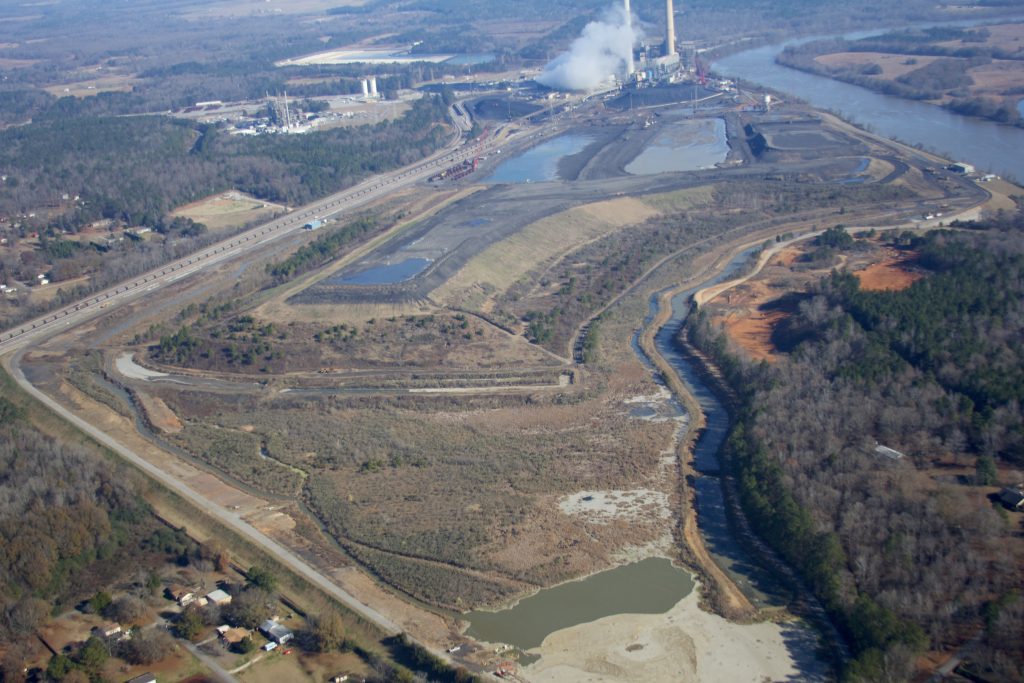
Alabama Power’s Gaston Steam Plant, with the Gypsum Pond visible in the background. Flight provided by Southwings. Photo (c) Frank Chitwood.
Last Friday, the Alabama Power Company released groundwater monitoring data for the Gaston Steam Plant in Wilsonville to the public for the first time. The disclosures, totaling over 2,500 pages, indicate that both the coal ash pond and the gypsum pond (areas where waste is stored) are leeching into groundwater.
Simultaneously on Friday, the Alabama Department of Environmental Management announced it would fine Alabama Power $250,000 for this contamination at Gaston, and a total of $1.25 million for similar contamination at four other coal fired power plants with ash pits: Miller, Gorgas, and Greene County on the Black Warrior River and Barry near Mobile.
Radioactive compounds in a monitoring well near the Coosa River were consistently between three to four times greater than the Maximum Contaminant Level (MCL) that is considered safe for drinking water. In a monitoring well at the gypsum pond, a newer pond that was built with a liner to reduce the chance of groundwater contamination, concentrations of arsenic consistently exceeded the MCL for drinking water standards. The company reported what are called Statistically Significant Increases (SSIs) in boron, calcium, chlorine, fluoride, pH, sulfate and total dissolved solids in some of the wells around the plant. This means concentrations of those parameters increased compared to background levels. The Gaston Steam Plant also discharges pollutants to Lay Lake and to the air via permits issued by ADEM. A Shelby County Water Services drinking water intake is located only a few miles downstream of the facility and serves the western portions of Shelby County.
We feel that the fine levied against Alabama Power is small compared to the seriousness of the contamination.
In a news story on WVTM13, the Mayor of Wilsonville agreed that the fine was “a slap on the wrist.” In 2016, Alabama Power reporter net income before dividends of $839 million. The $250,000 fine represents just 0.03% of the profit reaped by investors in the Alabama Power Company in 2016 alone. Meanwhile, residents in Wilsonville are likely to experience losses in property values and mental wellbeing. The US Census Bureau estimates there were 1,987 people living in Wilsonville in 2016; the Gaston fine equates to approximately $125 per resident.

A view of the Gaston Steam Plant with the Coosa River to the right. Photo (c) Frank Chitwood. Flight provided by Southwings.
Groundwater monitoring was never required by the Alabama Department of Environmental Management. A federal regulation, called the Coal Ash Rule, recently required groundwater monitoring and Alabama Power posted monitoring data to the public as required.
This was the first time the public was able to learn if groundwater in the area was contaminated, and it never would have happened without the federal regulations which the EPA is now trying to water down.
At a Wilsonville town council meeting in October 2017, Mike Godfrey with Alabama Power did not inform the town nor its residents that tests which had already been conducted indicated that groundwater was contaminated.
It is clear, however, that regulators at ADEM were privy to the information about groundwater contamination well in advance of the public disclosure, given their contemporaneous filing of Administrative Orders, yet they made no public announcement or warnings to locals in the area, some of whom have groundwater wells.

Gaston Steam Plant from the Coosa River near Yellowleaf Creek. Photo (c) Frank Chitwood

Alabama Power has announced they intend to permanently leave this coal ash and gypsum waste in place in Wilsonville. This is unacceptable as the groundwater monitoring data indicates the connectivity of the waste to the groundwater table, which would not be resolved by capping the waste in place. Alabama Power also operates the Gadsden Steam Plant in the city of Gadsden, but they have not provided groundwater monitoring data for that facility. As such, nothing is publicly known about groundwater contamination in Gadsden near that facility. Currently, the state is pushing to develop its own coal ash regulations and the EPA is pushing to roll back some of their regulations. The revelations of recent filings required by these regulations underscores the importance that the state implements a strong permitting program that does not let this waste continue to pollute ground and surface waters.
Our work on this issue falls under our Riverkeeper Patrol Program, which is funded by private grants and our membership. You can support this work by becoming a member or making a contribution today.



